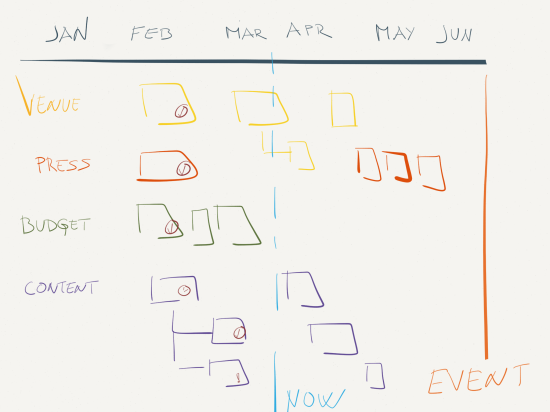Organising a conference is an activity that should count as an extreme working environment. It’s stressful and it requires good organizing skills of a wide range of people. If you don’t have a professional manager running it, you end up micromanaging your team. You’re also the only one that has all the information, that is often not document anywhere.
The Problem
If you run your business like that, people will let you know that you need to fix it. Get the processes and documentation in place instead of one indispensable person.
With events, you can solve this by hiring
a Professional Conference Organizer. An individual or a team that has enough experience that you can trust them with the project. They can also delegate the tasks in optional fashion.
Hiring a PCO isn’t an option if you don’t have the budget either because it’s a volunteer event or you just can’t raise enough money.
Solution – Big Picture
Organizing a conference is a straightforward process. You need to figure out:
• Budget (expenses, sponsors, ticket sales, etc.)
• Venues (main venue, party venus, etc.)
• Accommodation (speakers, offers for attendees, staff)
• Logistics (catering, booths, booklets, lanyards, etc.)
• Promotion (press releases, web site, marketing)
My hypothesis is that you can write all these areas as a series of tasks. Each task has a clear outcome, deadline and required skill level. Once we break down the project into small tasks, we can introduce a thin layer of technology around these processes.
The Solution – Website That Helps You Organize Your Event
Main interface shows you a Gantt diagram with project structure. Initial wizard asks you for dates and rough requirements, which it uses to generate tasks that lead up to the event.
Task themselves are simple: “Distribute Call for Papers”, with a date of 6 months before the conference.

Tasks themselves would act like Trello tickets. You would add extra comments and attachments to documents its status and progress. Making this part frictionless, would help with the documentation process.
E-mail and Calendar integration would an important part of the whole system. Sending timely reminders about due tasks could ease the amount of activity tracking for the main organizer.
As a bonus, having a previous event in the system, would you allow you compare the notes and reuse the documents and templates.
Benefits over classical Issue and Project Tracking tool
Preset templates would ensure that you have a good structure, that it’s hard to setup upfront. You get skills through experience, but it’s easy to overlook something.
Most of the tasks could be further linked to a knowledge base, with good practices and example document templates.
Can it earn enough to be a sustainable business?
Events usually have a set budget. This would prevent selling it as a subscription service. You might be able to show a significant saving for the team, but the team can’t pay you. The problem lies in the fact that you get most of the money just before the event. Most of the conferences just about break even.
Would Professional Conference Organizers pay for it?
They might, but they don’t need a hand holding tool. They have different needs that would be better served by a CRM tool. It also would not help them communicate with their client as they’re not selling a tool, but their services as organizers.
Conclusion
Right now, to me, it looks like a tool that I would use, but doesn’t have good business potential. It might get traction as a free tool, but you still couldn’t upsell it to a subscription service.
How would you improve the business model?
Do you know anyone that built a successful product in such a vertical?
